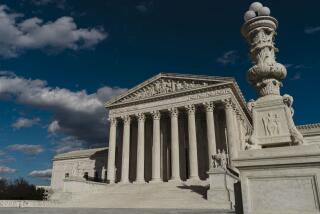Meese’s View of Miranda Rule
- Share via
Some of the negative responses you received (Letters, Oct. 17) regarding your editorial (Oct. 9), “Marshal Meese,” referring to Atty. Gen. Edwin Meese II’s opposition to the Miranda rule, concerning self-incrimination, seemingly came straight off of the wall.
I was especially enthralled by the letter from Police Chief Daryl F. Gates. Apparently Gates feels that any decisions handed down by the Supreme Court that do not favor law enforcement “have tortured the words of the Bill of Rights and the Constitution . . . “ Why doesn’t the chief give up on police work and start writing scripts for “Amazing Stories,” his twisted imagination is really sensational.
It seems to me that opposition to Miranda is perverse. The rule simply states that a person who is arrested (guilt or innocence is not in question) must be informed of his or her right to remain silent, and the right to be represented by an attorney. Where, pray tell, is the legal atrocity that tortures the Bill of Rights in this innocent requirement?
Gates, squirrel-like, hops on the old chestnut that “court-made rules have nothing to do with the Constitution,” and are an impediment to good law enforcement--in other words, these “rules” are technicalities in the law. As a policeman, Gates should know that so-called “technicalities”--in the sense in which he implies--do not exist. Only rights and duties under the American system of due process exist.
Then others raised the old war cry about letting criminals go free on probation and parole. Freeing them to commit more crime, but never recognizing the obvious fact that thousands of probationers and parolees hit the bricks and never again commit a crime. These people who are set free under our system of justice become useful and productive citizens.
Ronald Reagan, as Joseph R. Healey points out in his letter, is the one to bear the responsibility of Meese’s bizarre views. Meese is the worst attorney general since Harry Daugherty was appointed by Warren Harding in 1921.
PETE TORGE
Hollywood

